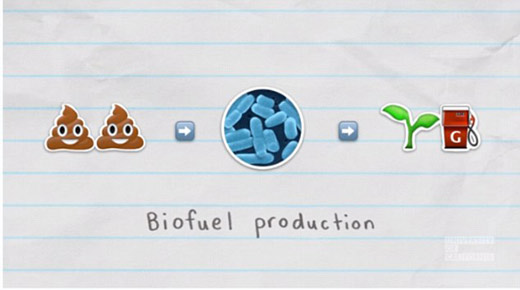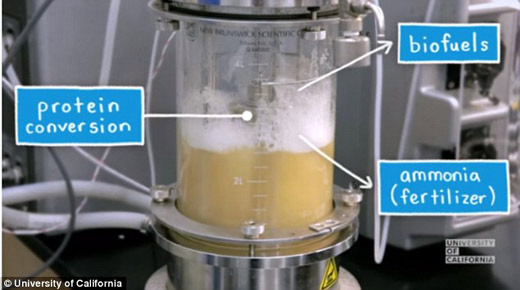當(dāng)前位置: Language Tips> 雙語新聞
Will your next car run on POOP? UCLA reveals 'high protein' fuel system that uses human waste
分享到

While experts are developing 'greener' alternative fuel sources, a group of undergrads are creating a more natural one.
當(dāng)專家們還在研發(fā)更環(huán)保的燃料時(shí),一群在校生已經(jīng)開始制作一種天然的燃料。
The team is working towards producing a biofuel that uses human and animal excretion, with the hopes of replacing harmful gasoline, diesel and jet fuel that dominate the market.
這個(gè)研究小組正在用人和動(dòng)物的排泄物生產(chǎn)生物燃料。他們希望以此替代目前占據(jù)市場(chǎng)主導(dǎo)地位但卻有害的汽油、柴油和噴氣燃料。
By engineering Bacillus subtilis, researchers are able to break down proteins and transform the left over material into alcohol biofuels and ammonia.
通過對(duì)枯草桿菌進(jìn)行處理,研究者們成功地分離了蛋白質(zhì),把排泄物轉(zhuǎn)化為酒精生物燃料和氨氣。

The US produces over 1 billion tons of animal and human waste every year, which does nothing but sit in an aerobically compost giving off harmful emissions.
美國每年產(chǎn)生超過10億噸的動(dòng)物和人類排泄物。它們?cè)緵]有任何用處,只能堆在耗氧肥料中釋放有害氣體。
David Wernick, a PhD candidate who graduated from the University of California, and his colleagues 'were struck by all the waste that is literally going to waste' and realized the material may have potential as a renewable fuel source, reports the University of California.
大衛(wèi)·韋尼克是畢業(yè)于加州大學(xué)的博士生。據(jù)加州大學(xué)報(bào)道,有一天,他和同事們靈機(jī)一動(dòng),想到這些被浪費(fèi)掉的排泄物或許可以轉(zhuǎn)化為可再生燃料。
'We're working with anything such as agricultural waste like manure, municipal waste like sewage, plant matter, cellulosic matter and even carbon dioxide out of the atmosphere,' said Wernick in a video discussing the research.
韋尼克在某個(gè)視頻中討論了這項(xiàng)研究:“我們正在不斷地實(shí)驗(yàn)。肥料之類的農(nóng)業(yè)廢棄物,污水等城市垃圾,還有植物、纖維素,甚至是空氣中的二氧化碳,我們都不放過。”
Wernick explained that the world is dominated by gasoline, diesel and jet fuel as the main transportation fuels.
韋尼克解釋說,汽油、柴油和噴氣燃料這些主要的交通燃料目前在世界上占據(jù)主導(dǎo)地位。
In 2014, the US consumed 375 million gallons of gasoline every day for the entire year, according to the US Energy Information Administration.
據(jù)美國能源情報(bào)署數(shù)據(jù),2014年,美國每天消耗3.75億加侖的汽油。
Gasoline isn't just a toxic and highly flammable liquid it also produces vapors that pollute our air.
汽油不僅是有毒、易燃液體,它還會(huì)釋放氣體,污染空氣。
Burning this liquid releases carbon dioxide into the atmosphere – the biggest culprit of climate change.
燃燒汽油會(huì)向大氣排放二氧化碳,這也是如今氣候變化的罪魁禍?zhǔn)住?/p>
And diesel and jet fuel do their part in polluting the air with polyaromatic hydrocarbons and nitrous oxides.
柴油和航空煤油使用過程中會(huì)釋放多環(huán)芳烴和氮氧化物,同樣會(huì)污染大氣。
Vocabulary
excretion: 排泄物
ammonia: 氨
aerobically: 需氧的
compost: 堆肥
culprit: 罪魁禍?zhǔn)?/p>
英文來源:每日郵報(bào)
譯者:葉霜艷
審校&編輯:丹妮
上一篇 : 印度考生考試時(shí)只允許穿內(nèi)褲
下一篇 : 中國兩會(huì)將傳遞哪些重要信號(hào)
分享到
關(guān)注和訂閱


關(guān)于我們 | 聯(lián)系方式 | 招聘信息
電話:8610-84883645
傳真:8610-84883500
Email: languagetips@chinadaily.com.cn